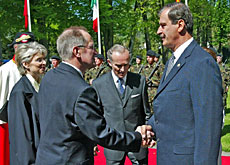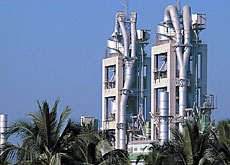Mexico and Switzerland talk trade

Trade relations between Mexico and Switzerland are becoming increasingly dynamic, thanks to a bilateral economic promotion programme.
During an official visit to Switzerland on Wednesday, Mexican President Vicente Fox stressed his country’s economic stability and good growth prospects.
Fox, who was invited to Switzerland by President Joseph Deiss, was holding talks in Bern with a Swiss cabinet delegation made up of Foreign Minister Micheline Calmy-Rey, Interior Minister Pascal Couchepin and Defence Minister Samuel Schmid.
The Mexican head of state was also due to meet Swiss business leaders. Swiss direct investments in Mexico total SFr4 billion ($3.08 billion).
“Mexico is a safe country [for investors], with low taxes and a stable currency,” Fox told reporters in Bern.
Human rights
Fox’s visit has prompted the Swiss section of the non-governmental organisation Amnesty International to raise the question of human rights in Mexico.
While praising Fox’s role in defending human rights on the international level, Amnesty demanded that Mexico take immediate action in the border state of Chihuahua, where it says hundreds of women have been abducted and killed since 1993.
“Amnesty International welcomes the promises made by the government to improve security and the rights of women, but deplores the fact that the local authorities have been inadmissibly slow in solving the crimes,” said the human rights group.
Opening up
The Swiss foreign ministry describes bilateral relations with Mexico as “very good”. Economic ties have strengthened since the Second World War, particularly over the past 20 years.
Since the 1980s the Central American state has opened up politically and economically. Fox’s election as president in 2000 brought an end to the 70-year rule of the Institutional Revolutionary Party (PRI) and heralded change.
The liberalisation of the Mexican market began with the entry into force in 1994 of a free-trade accord with the United States and Canada.
It was followed by moves to open up trade with Europe, in a bid to avoid an over-reliance on the US. In 2002 Mexico signed a second free-trade agreement with the European Union.
Bilateral agreements
At the same time, Mexico was concluding bilateral accords with Switzerland aimed at promoting and developing economic and trade relations.
In the past ten years the two countries have signed an agreement on dual taxation (1994) and another on the protection of investments (1995).
A free-trade agreement with the European Free Trade Association (Efta) was concluded in 2000 and supplemented by a bilateral agricultural agreement with Switzerland.
The two sides are currently debating two more agreements: on mutual legal assistance and the protection of cultural assets.
“We’re on track to wrap up these negotiations very swiftly,” Deiss said.
Money laundering
Good relations between the two countries were tested in 1995 when the Swiss justice authorities opened an investigation into alleged money laundering by Raul Salinas, the brother of the then president, and froze bank accounts containing SFr130 million.
Since then Swiss-Mexican relations have returned to normal.
Good framework conditions have encouraged Swiss exports, which have almost doubled in the past 12 years from SFr458 million in 1990 to SFr914 million in 2003.
Switzerland exports primarily machines, chemical and pharmaceutical products, and timepieces to Mexico.
Imports from Mexico amounted to a rather more modest SFr219 million in 2003, but were nevertheless four times the 1990 level (SFr54 million). Switzerland imports agricultural products, machines and replacement parts from Mexico.
Switzerland is Mexico’s sixth-biggest export market, ahead of France, Japan and Britain.
The various bilateral accords are expected to lead to further Swiss investment in Mexico. Around 400 Swiss businesses are currently active in Mexico, including Nestlé, Victorinox and Switzerland’s two largest banks, Credit Suisse and UBS.
swissinfo, Erwin Dettling
Development of Switzerland’s trade relations with Mexico:
1990: Exports – SFr458 million.
1990: Imports – SFr54 million.
2002: Exports – SFr990 million.
2002: Imports – SFr184 million.
2003: Exports – SFr914 million.
2003: Imports – SFr219 million.
Fox is making a five-day visit to Europe, taking in new EU members Poland and Hungary as well as Switzerland.
The visit comes three weeks before Latin American and Caribbean heads of state are due to meet their EU counterparts in the Mexican city of Guadalajara.

In compliance with the JTI standards
More: SWI swissinfo.ch certified by the Journalism Trust Initiative

You can find an overview of ongoing debates with our journalists here. Please join us!
If you want to start a conversation about a topic raised in this article or want to report factual errors, email us at english@swissinfo.ch.